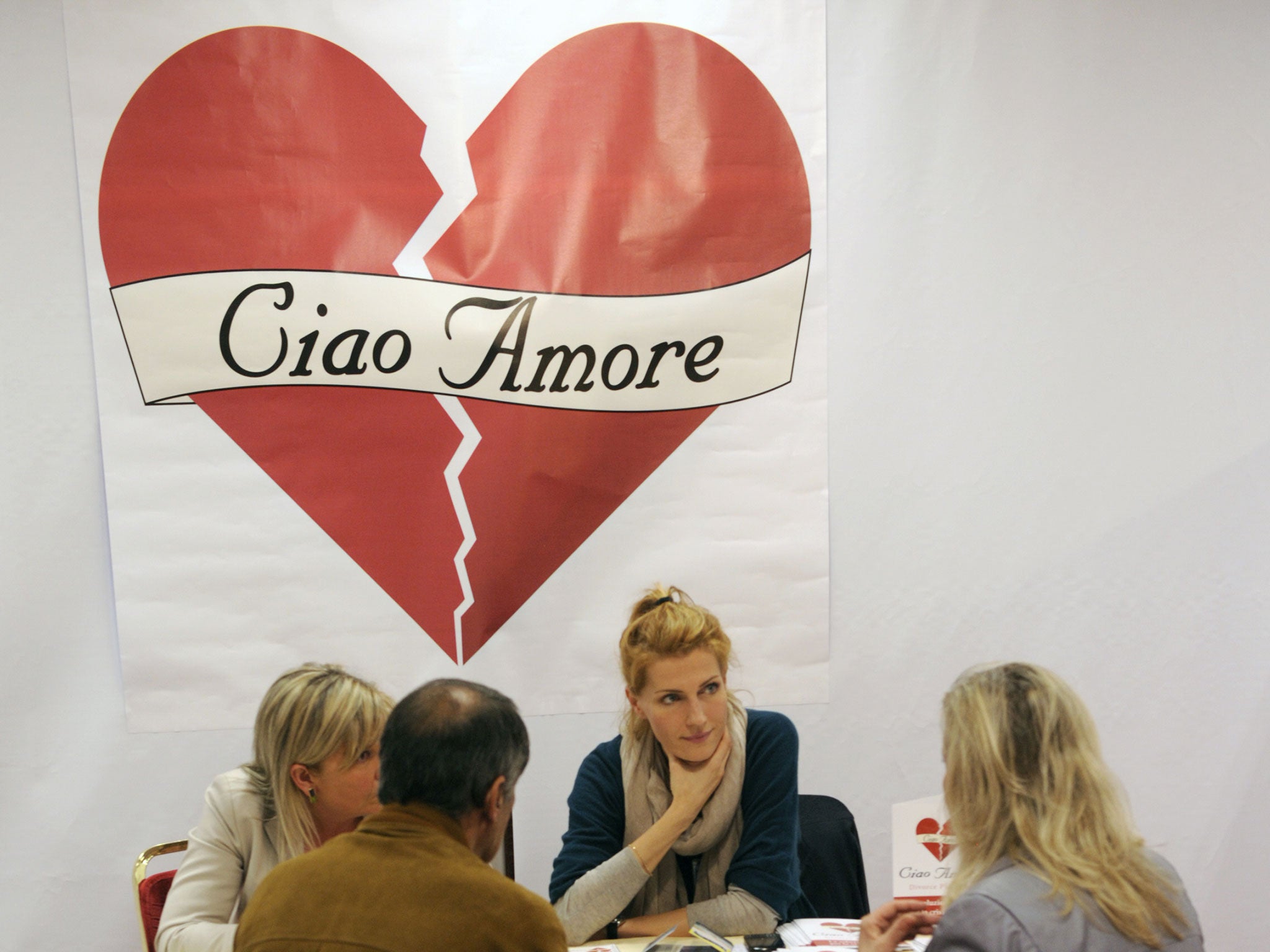Italian couples fake UK divorce scam on an ‘industrial scale’
Family lawyers blamed the 'overloaded' British court system for the scam

Your support helps us to tell the story
From reproductive rights to climate change to Big Tech, The Independent is on the ground when the story is developing. Whether it's investigating the financials of Elon Musk's pro-Trump PAC or producing our latest documentary, 'The A Word', which shines a light on the American women fighting for reproductive rights, we know how important it is to parse out the facts from the messaging.
At such a critical moment in US history, we need reporters on the ground. Your donation allows us to keep sending journalists to speak to both sides of the story.
The Independent is trusted by Americans across the entire political spectrum. And unlike many other quality news outlets, we choose not to lock Americans out of our reporting and analysis with paywalls. We believe quality journalism should be available to everyone, paid for by those who can afford it.
Your support makes all the difference.If it hadn’t been for an “eagle-eyed” clerk at Burnley county court, the scam would have gone unnoticed. Sorting through documents, she spotted that two separate Italian couples who were seeking to divorce had listed the same residential address.
And even more bizarre, the address wasn’t in Burnley – it was a mailbox 200 miles away in Berkshire.
Further investigation soon found that a Maidenhead-based fraudster had committed a scam on an “industrial scale” by convincing 137 county courts across England and Wales to rubber-stamp fake divorces for 179 Italian couples, who were supposedly living in England.
Top family judge Sir James Munby found that there was no reason to believe that the 200 couples had ever lived in Britain, however. Instead, the unhappy Italian couples were trying to get around controversial laws meaning a divorce is not granted before a three-year separation period, even if it is consensual. If the legal separation is contested, things are still more time-consuming.
Family lawyers blamed the “overloaded” British court system for the scam, calling for tax revenue from “big cases” in the London courts to be used to ease the burden – while Italian legal experts have warned the fraud could give genuine Italian clients a “bad name”.
Francesca Rossi, an international divorce and family solicitor at Anglo-Italian law firm Tanda Migliorini & Associates in London, said: “This case in Maidenhead is so frustrating because if the Italian system wasn’t so incredibly slow and convoluted we wouldn’t see fraud like this.”
“Moves to shorten divorce timescales have been dragging on for years in the Italian parliament and obviously people are becoming quite desperate and search for an easier solution here in the UK, where many Italians have contacts and the ability to set up an address”.
Her fear is that the scam may cause reputable Italians problems in the British courts. “We have enough problems with international divorces without the courts becoming paranoid.”

Divorce only became possible in Italy following a referendum in 1974. This was decades after the rest of Europe, thanks largely to the powerful and socially conservative influence of the Vatican.
But hope is on the horizon. The Italian parliament's Justice Commission, headed by Donatella Ferranti, has produced proposals for quicker divorces – under which the separation period would be slashed to just six months for consensual divorces and 12 months for contested divorces.
The lower house of parliament has already approved the plans. With backing from the Senate, it could be law before Christmas.
Ms Ferranti, of the centre-left Democratic Party, told The Independent: “We’ve got good cross-party support for this. And the new law is important, as events in the UK indicate. It will speed things up including for those people who are already building new relationships. It will reduce suffering and uncertainty for everyone, including the children.“
But the traditionalists are not going without a fight. L’Avvenire, the daily newspaper of the ultra-conservative Italian Bishops Conference, yesterday hit out at what it called “do-it-yourself” divorces.
In Maidenhead, fraudsters are thought to have made close to £500,000 before the scam was uncovered and the divorces, which were legally binding in Italy, were halted.
In total 179 divorces, each costing the unhappy couples £3,000 to £4,000, have now been cancelled in a move that has been hailed as “extraordinary” by legal experts and blamed on the “overloaded” court system.
Ayesha Vardag, president of law firm Vardags, said “Our court system is overloaded and underfunded. That has enabled these fraudsters to use it dishonestly… We urgently need the massive tax revenue from the big [divorce] cases running through the London courts to be deployed to make the whole system run better.”